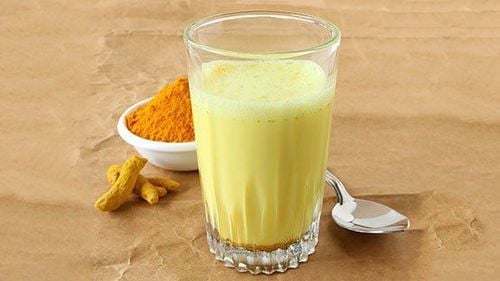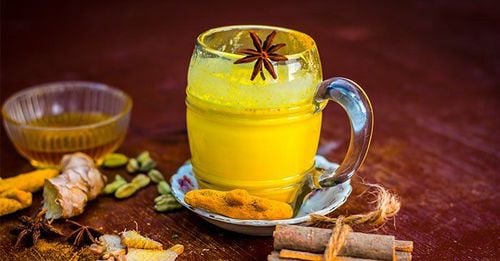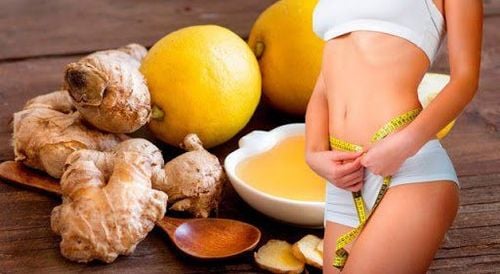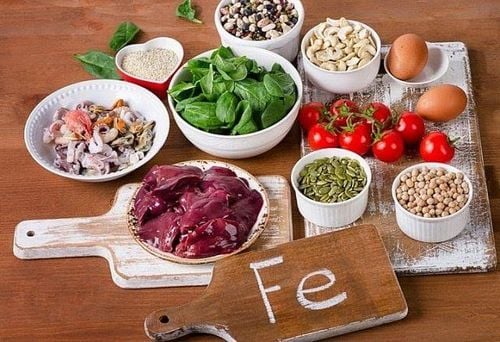This is an automatically translated article.
Turmeric milk, also known as golden milk, is a beverage originating from India and gradually becoming popular, especially in European countries. Bright yellow turmeric milk is made from cow's milk or plant milk mixed with turmeric powder and other spices like cinnamon or ginger. Turmeric milk has many health benefits, helping to strengthen the immune system and prevent disease.1. Turmeric milk contains antioxidants that are good for the body
The key ingredient in turmeric milk is turmeric powder. Turmeric powder has long been a popular coloring spice in Asian cuisine. Curcumin is an active ingredient in turmeric that has been widely used in Ayurvedic medicine for centuries. Curcumin has strong antioxidant properties that help protect the body and fight cell damage caused by oxidative stress.Antioxidants are essential for cell functioning. Studies show that a diet rich in antioxidants helps to reduce the risk of infection and prevent disease. Besides, most turmeric milk recipes contain ginger and cinnamon, both of which have high antioxidant properties.
2. Turmeric milk can help relieve pain and arthritis
The ingredients in turmeric milk have strong anti-inflammatory properties. Chronic inflammatory processes play an important role in the development of chronic diseases such as cancer, metabolic syndrome, Alzheimer's and cardiovascular disease. Therefore, a diet rich in anti-inflammatory substances may reduce the risk of these chronic conditions.Research shows that ginger, cinnamon and curcumin (the main ingredients in turmeric milk) have strong anti-inflammatory properties. Even curcumin's anti-inflammatory effect is comparable to some pharmaceutical drugs without any side effects.
These anti-inflammatory effects can reduce pain caused by arthritis or rheumatoid arthritis. A study in 45 patients with rheumatoid arthritis, found that taking 500 mg of curcumin was more effective in reducing pain than using 50g of a common anti-inflammatory drug. Similarly, in a 6-week study of 247 subjects with osteoarthritis, those who took ginger extract had fewer symptoms of pain and reduced need for pain medication than those who did not. .
3. Turmeric milk can improve memory and brain function

Sữa nghệ là thực phẩm tốt cho não bộ, có khả năng cải thiện trí nhớ
Other ingredients present in turmeric milk also have many benefits for the nervous system. One of the hallmarks of Alzheimer's disease is the accumulation of a protein in the brain called Tau protein. Test-tube and animal studies suggest that compounds from the cinnamon plant may help reduce the accumulation of this protein. In addition to us, cinnamon also reduces symptoms of Parkinson's and improves brain function.
Ginger present in turmeric milk can boost nervous system function by improving brain reaction time and memory. In animal studies, ginger has been shown to counteract the loss of brain cells caused by aging.
4. Curcumin present in turmeric can help improve emotional state
The active ingredient curcumin may help improve mood and reduce symptoms of depression. A 6-week study in 60 patients with depression randomized curcumin, an antidepressant, or a combination of both. Those taking curcumin had similar mood improvements as the antidepressant group, and the group taking the two had the greatest effect.Depression is also associated with BNDF. When taking curcumin, it helps increase BDNF levels, which helps reduce symptoms of depression.
5. Turmeric milk also works against cardiovascular diseases
The ingredients in turmeric milk such as turmeric, ginger, and cinnamon are substances that help reduce the risk of cardiovascular disease.An analysis of 10 studies shows that 120mg per day can reduce total cholesterol, triglycerides and LDL cholesterol levels and increase HDL cholesterol levels. Another study in 41 patients with type 2 diabetes used 2g sets of ginger per day. By week 12, the risk factors for cardiovascular disease were reduced by 23 to 27%.
In addition, curcumin improves the function of the endothelium of blood vessels. Endothelial function is important in cardiovascular diseases. One study in heart surgery patients who received 4g of curcumin before and after surgery showed a 65% reduction in the risk of myocardial infarction during hospital stay compared with patients who did not.
These anti-inflammatory and antioxidant properties also help protect the cardiovascular system. However, the results are mostly based on small studies and more studies are needed to reach more valid conclusions.

Những thành phần có trong sữa nghệ như nghệ, gừng, quế là những chất giúp làm giảm nguy cơ mắc bệnh tim mạch
6. Turmeric milk has the effect of lowering blood sugar
The ingredients in golden milk, especially ginger and cinnamon, may help lower blood sugar. Using 6g of cinnamon per day can reduce blood sugar levels at that time by up to 29%. Besides, cinnamon can reduce insulin resistance. Insulin-resistant cells are less able to absorb blood sugar, so reducing insulin resistance leads to better blood sugar control.Cinnamon helps to reduce the amount of glucose absorbed in the intestine after eating, which helps to better improve blood sugar control. Similarly, regularly including small amounts of ginger in the daily diet can reduce fasting blood sugar levels by up to 12% and lower HbA1C levels.
However, most turmeric milk recipes have added sweeteners from honey or syrup. Do not add sugar to turmeric milk if you want to use them for the purpose of stabilizing blood sugar.
7. Turmeric milk may reduce the risk of cancer
Cancer is caused by uncontrolled cell growth. In addition to conventional treatments, alternative anti-cancer remedies are increasingly popular. Some studies suggest that components in turmeric milk may help reduce the risk of cancer.An anti-cancer agent is 6-gingerol which is abundant in ginger. Compounds in cinnamon may also help reduce the growth of cancer cells. Curcumin, the active ingredient in turmeric, can also kill cancer cells and prevent the growth of new blood vessels in tumors, limiting their ability to metastasize. However, research has yet to determine how much of each ingredient needs to be consumed to reap these benefits, so more research is needed.
8. Turmeric milk has antibacterial, antiviral and antifungal properties

Sữa nghệ có thể được sử dụng như một phương thuốc chống cảm lạnh tại nhà
Compounds in fresh ginger can inhibit the growth of some bacteria. Ginger extract can fight human respiratory syncytial virus (HRSV), a common cause of respiratory infections.
Laboratory studies have shown that cinnamaldehyde (a compound found in cinnamon) can inhibit the growth of bacteria. In addition, it can help treat respiratory infections caused by fungi. The ingredients in turmeric milk also have powerful antioxidant and anti-inflammatory properties that help boost the immune system.
9. Ginger and Turmeric Improve Digestion
Chronic indigestion (bloating) causes pain and discomfort in the epigastrium. Slow digestion in the stomach is one cause of this symptom. The ginger present in turmeric milk can help relieve this condition by speeding up digestion in the stomach.Research also shows that turmeric can also help relieve symptoms of indigestion. Turmeric can also improve fat digestion by increasing bile production by up to 62%.
In addition, turmeric can help maintain normal digestive function and prevent ulcerative colitis and another digestive disorder.
10. Calcium and Vitamin D in turmeric milk contribute to strong bones
Both cow's milk and plant-based milk are high in calcium and vitamin D, which are two nutrients needed to develop and maintain strong bones. If the diet is too low in calcium, the body begins to break down calcium in the bones to maintain normal calcium levels in the blood. Over time, this makes bones weak and fragile, increasing the risk of bone diseases, such as osteoporosis.Vitamin D contributes to strong bones by improving the absorption of calcium from food. Therefore, low levels of vitamin D in the body can lead to weak and brittle bones, even if your diet is rich in calcium.
Although cow's milk naturally contains calcium and is often fortified with vitamin D, not all milk contains many of these nutrients. If you prefer to make turmeric milk with plant-based milk, you should choose milks rich in both calcium and vitamin D for additional bone benefits.
11. How to make turmeric milk

Sữa vàng (sữa nghệ) rất dễ làm tại nhà
Ingredients:
1/2 cup (120ml) unsweetened milk 1 teaspoon turmeric powder 1 piece fresh grated ginger or 1/2 teaspoon ginger powder 1/2 teaspoon cinnamon powder 1 pinch black pepper 1 teaspoon honey honey or maple syrup (optional) To make turmeric milk, simply mix all ingredients in a small pot and bring to a boil. Then reduce the heat and simmer for about 10 minutes or until fragrant. Strain the drink through a fine sieve into a cup and sprinkle over the top with some cinnamon. Golden milk can be stored in the refrigerator for up to five days, each use simply reheating before drinking.
Any questions that need to be answered by a specialist doctor as well as customers wishing to be examined and treated at Vinmec International General Hospital, you can contact Vinmec Health System nationwide or register online HERE.
See more:
Does turmeric help you lose weight? Apricots, turmeric, honey... do they work to treat H.Pylori bacteria? Why you should start your morning with a slice of fresh ginger













